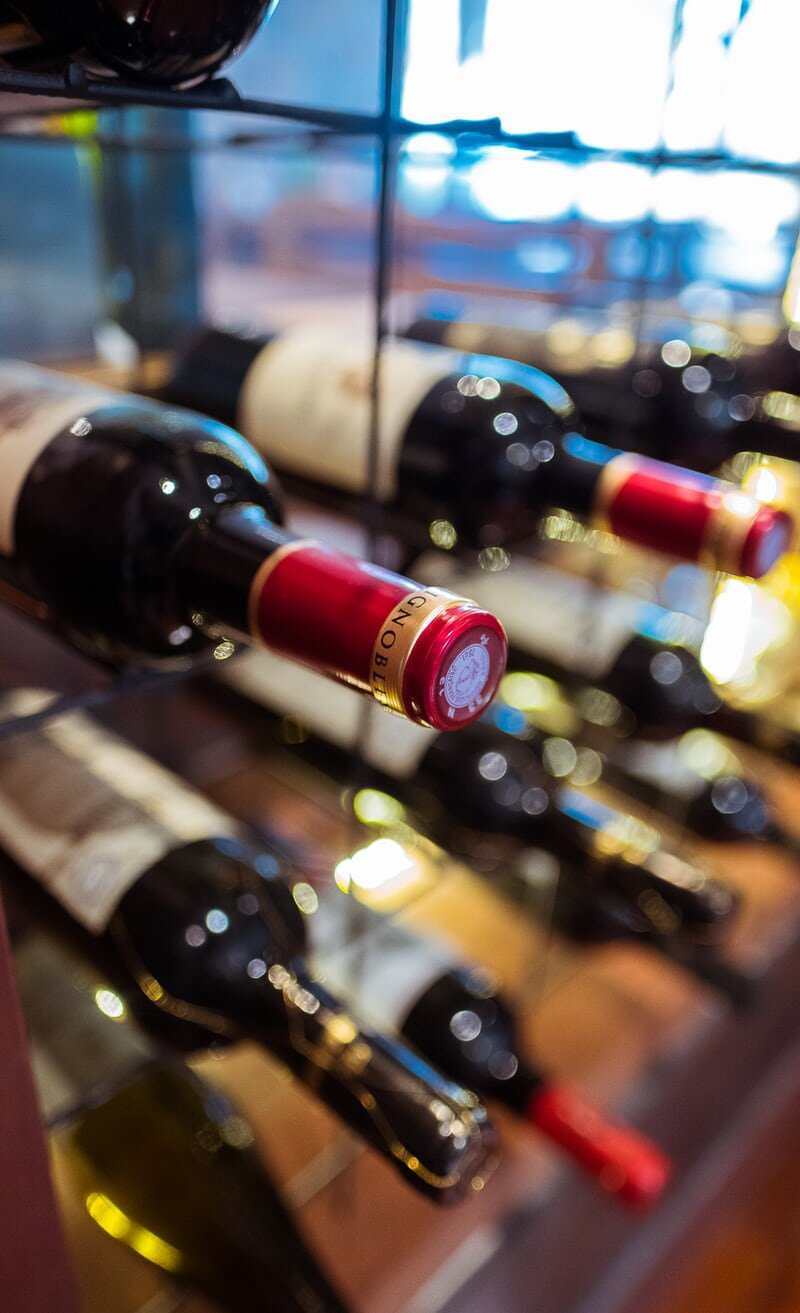Wine collecting is a pastime that can be deeply gratifying, though it may be overwhelming to know where to start. Before we offer our tips, we want to address the perception that all wine collectors purchase and collect wine for status or for investment purposes. We have discovered, thanks to recent innovations in refrigeration and humidity control, starting a wine collection has a reduced barrier to entry in terms of cost. In this blog, we’ll share are a few things to consider before starting a wine collection and some tips for keeping your wine collection safe and optionally insured.
Before we continue, though, a little about the KnowWines blog. We are an Amazon.com affiliate and we do receive a small commission if you purchase items through our affiliate links at no cost to you. The commissions we receive help us pay for web hosting fees, products to test, and other costs associated with running this site. Thanks for using our affiliate links and supporting our independent blog!
Wine Collecting: Know Your Why
How you buy wine and which wines you purchase will vary depending on why you’re interested in collecting wine in the first place. So, ask yourself why you want to collect wine. Below are a few common reasons.
Wine For Personal Consumption
Most wine enthusiasts start a wine collection to have a few bottles of wine on hand for personal consumption. This reduces trips to the wine shop and means that you’ll always have a bottle of wine on hand that appeals to your tastes. Or, perhaps you really like a specific wine that isn’t common or easy to come by in wine shops. In this case, you may want to have more than one bottle on hand.
One caveat on collecting wine for personal consumption is that a person’s taste in wine may change. In some cases, your taste can change dramatically over months and years. Therefore, one of the risks for collecting wine is that you could develop a giant stash of bottles that you are not interested in. If that occurs, you can always sell your wine online through an auction house, though that effort may not appeal to everyone.
Wine For Sharing
If you love to entertain, or are the person known for always bringing great wines to a dinner party instead of making a side dish or entree, then you may want to collect wine for the purpose of sharing it with friends and family. Wine is, after all, perfect for bringing people together!
Having several great bottles of wine on hand means that you’ll always have wine to choose from for that very special occasion, be it an anniversary, a graduation, a wedding, a birthday, a job promotion, or retirement. Wine makes a great gift that many people appreciate!
Wine Collecting as an Investment
With market instability, some investors like to diversify their portfolio with wines. When purchasing these wines, provenance is of utmost importance. Be sure to keep receipts of wine purchases and document how the wines are stored.
If you want to keep up to date on the most valued wines for investments, we recommend following the international auction house Sotheby’s.
Alternatively, you can read more about wine investing here in the helpful eBook Investing in Fine Wine. This book addresses strategies for buying, selling, collecting, and storing fine wines. The narrative approach also offers a window into the world of wine trading.
Determine a Focus & Strategy for Your Wine Collection
Go Broad with your Wine Collection
Some wine lovers want to “go broad” in their collection, collecting wines typical of particular styles or regions. If this is approach interests you, we recommend two resources.
First, we love Elizabeth Schneider’s Wine for Normal People. This no-nonsense, down-to-earth guide provides a thorough introduction to the world of wine. This book will teach you about wine tasting, wine regions, wine making, wine etiquette, and yes, how to purchase wine for your budding collection.
The second resource for those seeking a broad overview of wine styles and regions is WSET (Wine and Spirit Educational Trust). Their WSET Level 1 and Level 2 courses give a macro level view of the entire world of wine and a comprehensive understanding of the styles of wine available.
Collect Aged Wines
This is of the most popular reasons for collecting wine: enjoying wines that have spent some time in the bottle.
It’s important to note that not everyone likes the flavor of aged wines. As wines age, the fruit aromas and flavors change. Secondary and tertiary aromas and flavors develop and are detected in aged wines.
If you don’t have much experience with aged wines, visit a winery, restaurant, or local bottle shop and ask if they have aged wines available to taste or an upcoming tasting.
Collect to Support Your Favorite Winery
Some people simply love to collect wine from their favorite winery to support it. If this approach appeals to you, consider joining a wine club (it’s a lot like buying season tickets to your favorite sports team!).
Collect Wine to Have on Hand for 0-5 Years or 5 - 50 Years
In today’s fast-paced world, collecting wine to have on hand for more than a year from now is a waning trend. Many of today’s wines are intended for immediate consumption.
Still, collecting wine for the future is enjoyable for people who maintain the wine collecting passion. There are some wines that are crafted with the intention of being consumed immediately or within five years, and others that are intended for consumption 20 to 30 years from now.
A knowledgeable wine seller will let you know if the particular wine you love falls into any one of these categories: drink now, hold for the short term, or hold for several years.
Develop A Relationship With A Wine Seller
Connecting with a local wine seller is especially important if you’ve collected wine for the purpose of reselling.
Why?
Because wine trends change over time. The value of wines increase and decrease depending upon vintage, food and beverage trends, the trendiness of a region or producer, and the location where wine is consumed.
A wine seller can help you understand these variables as they relate to the value of your wine collection.
Determine Your Wine Storage Needs
While an actual cave is not necessary anymore due to advances in wine refrigeration, you do need to plan a storage solution for your wine.
If you will be drinking your collected wines within a year or so, and your storage space (like a closet or pantry) is not exposed to light or vibration and the temperature is fairly consistent at about 72 degrees F, then you likely don’t need to invest in a wine cabinet.
If you desire to age wines for 3-5 years and grow your collection, you should consider purchasing a wine cabinet. Wine cabinets can vary widely in cost, from about $200 for a small wine refrigerator to over $1000 for a wine maturation cabinet like the EuroCave. There are also quite a few wine cabinets with mid-range pricing that are still very high quality.
If you’re not interested in purchasing a wine cabinet (or simply don’t have space for one), you can consider finding temperature and humidity controlled wine storage, like Extra Space Storage or one of these storage locations in the USA. You could also contact your local wine bottle shop to see if they have recommendations for wine storage.
Manage Your Wine Inventory
Make a Spreadsheet or Use a Wine Tracking App
An easy, inexpensive way to do this is with a template from Google Sheets or Excel.
We prefer to manage our wine collection with Cellar Tracker, an online cellar management tool. We like this tool because these folks have truly thought of almost everything you would want or need to track on your wine, including the location and shelf where your wine is stored in your wine cabinet or off-site storage. The crowd-sourced wine prices are also helpful for those interested in monitoring the auction price of their wine or just to see others’ tasting notes as wines age in their cellars.
Establish A Drinking Schedule As You Accumulate Bottles
There are pitfalls you may encounter as your wine collection grows. One issue that collectors run into is keeping wine for a special occasion only to find that the wine is bad.
For this reason, if you have a growing wine collection, it’s a good idea to keep an eye on the drinkability window for your wines. We use information on drinking windows available online (on apps and websites like Cellar Tracker) as general rules of thumb, though these drinking windows are not an exact science.
Know Your Wine’s Value
There are a number of wine buyers online who will evaluate the value of your wine for free, and follow up with you in case you have an interest in selling some bottles.
For those interested in researching wine prices on your own, we like Wine Searcher and Cellar Tracker for determining the value of the wine.
Wine Searcher will tell you what your wine is selling for near you. Let’s say you just drank a bottle of 2003 Auslese Riesling, purchased in 2010. You can go to Wine Searcher and find what that bottle sells for today in case you want to stock up on some more for the future. Cellar Tracker has a feature that allows you to see what wines like yours have sold for at recent auctions.
Insure Your Wine
Wine is typically not covered by homeowner insurance policies. The simplest reason reason is that processes and procedures to underwrite an annual policy for $100 to $300 are not profitable for home insurance companies.
Many wine lovers may forego purchasing a wine insurance policy as they prefer to self-insure (meaning, if their wine collection were to flood or the air conditioning fail, they would accept the risk that their collection could be lost).
If your wine collection grows and you have an interest in insuring your wine, understand that “blanket” wine insurance costs about 50 cents per $100. So if your wine collection is 500 bottles, that works out to be about $250 per year. Most of these wine insurers will insure individual bottles up to $1000 in value. Cellar Tracker has a helpful article on wine insurance if you want to learn more.
In Conclusion
While many wines today are designed for immediate consumption, wine enthusiasts and collectors may want to start their own collection to meet one or more personal objectives.
When starting a collection, think about who will consume the wine and when, and whether you intend to consume all the wine or sell some or all of it at auction. Make sure your wine collection is stored correctly and that you have some mechanism for tracking your purchases.
We hope that your wine collection will provide fun and value for years to come with just a little planning up front.
Cheers!







